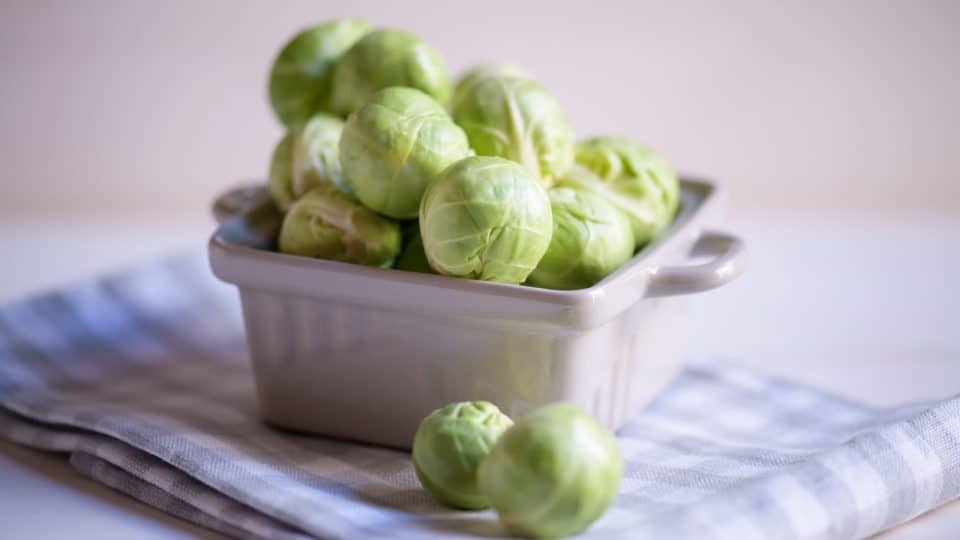- Not a substitute for professional veterinary help.
We love a good bowl of roasted Brussels sprouts with dinner. They’re a healthy side dish. But if your dog gives you their best puppy-dog eyes while you eat your sprouts, you might be unsure if they are pup-friendly. Luckily, yes, dogs can eat Brussels sprouts.
Many dogs can eat cooked Brussels sprouts, although you’ll need to feed them a small serving relative to their body size.
Learn more about the potential pros of adding them to your dog’s diet below, and get insight on the expert-approved serving size.
Are Brussels Sprouts Nutritious for Dogs?
“Brussels sprouts are safe for dogs but should be given in very small quantities,” says Kathryn Dench, veterinarian and chief scientific officer at Paw Origins. Like other vegetables, they contain healthy vitamins, nutrients, antioxidants, and fibre beneficial for dogs.
Some of the specific health benefits of Brussels sprouts for dogs may include the following.
- Better bathroom trips. “Brussels sprouts provide dietary fibre, which can support digestive health and regular bowel movements in dogs,” says Patrick Wilson, a veterinarian with WellPet.
- Healthy skin and joints. Brussels sprouts contain vitamin C. Dr Wilson says these nutrients support a dog’s collagen production for healthy skin and joints.
- Immune support and healthy vision. Brussels sprouts are a great source of vitamin A. This vitamin is “essential for vision health, immune function, and skin health in dogs,” Dr Wilson says.
- Strong bones. Lastly, Brussels sprouts contain vitamin K, which Dr Wilson says can promote bone health and blood clotting.
How Many Brussels Sprouts Can Dogs Eat?
According to Dr Wilson, dogs of differing sizes can handle the following serving sizes of Brussels sprouts.
- Small dogs: 1-2 teaspoons of cooked Brussels sprouts as an occasional treat.
- Medium dogs: 1-2 tablespoons of cooked Brussels sprouts.
- Large dogs: 2-3 tablespoons of cooked Brussels sprouts.
“You can lightly steam or boil Brussels sprouts until they are soft but still retain some texture,” Dr Wilson says. Make sure you chop the sprouts into smaller pieces to avoid a potential choking hazard for smaller dogs.
What Are the Risks of Dogs Eating Brussels Sprouts?
The main drawback of Brussels sprouts for dogs is their high fibre content. Dr Wilson says this can lead to:
Other dogs may have larger bowel movements or need more frequent trips to the garden. Consult your vet before giving your dog Brussels sprouts if they have a sensitive stomach or a digestive condition.
“Additionally, raw Brussels sprouts contain an enzyme that can interfere with thyroid function in large quantities,” Dr Wilson adds. Cooking Brussels sprouts deactivates this enzyme. Always cook Brussels sprouts before giving your pup a bite.
What Other Fruits & Veggies Are Safe for Dogs to Eat?
Looking for fruits and vegetables that your pup can chow down on in bigger quantities? Try the following options for a balanced doggie diet!
| Fruit/Veggie | Benefit | Serving Idea(s) |
| Apples | Full of antioxidants, vitamin B6, fibre, and minerals like magnesium | The crunchy texture makes them perfect for healthy treats! |
| Watermelon | Contains vitamins A, B12, E, K, and other key nutrients like magnesium and potassium | Perfect for watermelon ice cream, jerky, and other frozen treats during hot weather |
| Bananas | They contain vitamins A, B6, C, and K, potassium, fibre, and magnesium | Pair perfectly with a dog peanut butter—many pups’ favourite snack |
| Pumpkin | Full of fibre, Vitamin C and B6, and antioxidants | Homemade pumpkin dog treats and pumpkin ice cream are all-time favourites |
| Spinach | Contains several vitamins and nutrients, including A, B6, B12, C, K, iron, and calcium | Add finely chopped, unseasoned spinach as a dog food topper |
| Sweet Potatoes | Contains vitamins like C, B6, and B12, minerals like calcium and magnesium, and other nutrients like beta-keratin | A small serving can make a nutritious addition to your dog’s favourite wet food. There are also many delicious dog-safe recipes with sweet potatoes |
Takeaway
Brussels sprouts are an excellent source of nutrients for your dog in small quantities. That said, your pup can have too much of a good thing. The high fibre content in Brussels sprouts can lead to digestive symptoms.
With this in mind, your dog can enjoy the potential pros of snacking on Brussels sprouts without tummy trouble. Remember to get your vet’s approval before adding new food to your dog’s diet!



